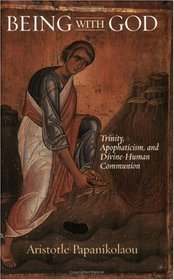Search -
Being With God: Trinity, Apophaticism, And Divine-Human Communion
Being With God Trinity Apophaticism And Divine-Human Communion
Author:
"Being With God is an exceedingly important and well-written book on Orthodox theology of the Trinity. It not only explains the work of two major contemporary Orthodox theologians; it also lends vital insight into the nature and character of contemporary Orthodox theology in general." —Vigen Guroian, Department of Theology, Loyola Co... more »
Author:
"Being With God is an exceedingly important and well-written book on Orthodox theology of the Trinity. It not only explains the work of two major contemporary Orthodox theologians; it also lends vital insight into the nature and character of contemporary Orthodox theology in general." —Vigen Guroian, Department of Theology, Loyola Co... more »
ISBN-13: 9780268038311
ISBN-10: 0268038317
Publication Date: 2/28/2006
Pages: 238
Rating: ?
ISBN-10: 0268038317
Publication Date: 2/28/2006
Pages: 238
Rating: ?
0 stars, based on 0 rating
Publisher: University of Notre Dame Press
Book Type: Paperback
Other Versions: Hardcover
Members Wishing: 1
Reviews: Amazon | Write a Review
Book Type: Paperback
Other Versions: Hardcover
Members Wishing: 1
Reviews: Amazon | Write a Review
Genres:
- Religion & Spirituality >> General
- Religion & Spirituality >> Worship & Devotion >> General
- Christian Books & Bibles >> Orthodoxy
- Christian Books & Bibles >> Theology >> General
- Christian Books & Bibles >> Theology >> Systematic




